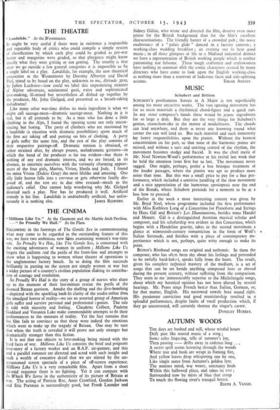Schubert and Britten
MUSIC
SCHUBERT's posthumous Sonata in A Major is not superficially among his more attractive works. The vast opening movement has for its main materials a rhythmical chord-figure and a quick run. In any other composer's hands these would be jejune ingredients for so large a dish. But they are the very things for Schubert's genius, chameleon-like in the matter of modulations. The chords can lead anywhere, and there is 'never any knowing round what corner the run will land us. But such material and such immensity lay heavy responsibilities upon the pianist. Without the keenest concentration on his part, so that none of the harmonic points are missed, and without a sure and untiring control of the rhythm, the movement becomes stodgy and flaccid. It was the chief merit of Mr. Noel Newton-Wood's performance at his recital last week that he held the attention from first bar to last. The movement never sagged. One might, perhaps, prefer a less brusque treatment of the louder passages, where the pianist was apt to produce more noise than tone. But this was a small price to pay for a fine per- formance, which included a sensitive handling of the slow movement and a nice appreciation of the humorous aposiopesis near the end of the Rondo, where Schubert pretends for a moment to be at a loss how to proceed.
Earlier in the week a most interesting concert was given by Mr. Boyd Neel, whose programme included the first performance with Miss Kathleen Long of a Concertino for Pianoforte and Strings by Hans Gal and Britten's Les Illuminations, besides some Handel and Mozart. Gal is a distinguished Austrian musical scholar and composer, and his scholarship was evident in this Concertino, which begins with a Handelian gravity, takes in the second movement a glance at nineteenth-century romanticism in the form of Wolf's • Italian Serenade, and finishes with a piece of contemporary im- pertinence which is not, perhaps, quite witty enough to make its point.
Britten's Rimbaud songs are original and authentic. In them the composer, who has often been shy about his feelings and pretended to be awfully hard-bakei, speaks fully from the heart. The result, given his complete technical mastery of the medium, is a set of songs that can be set beside anything composed here or abroad during the present century, without suffering from the comparison. They seem to me immeasurably superior to the Michelangelo songs, about which my heretical opinion has not been altered by several hearings. Mr. Pears sings French better than Italian, German, or, for that matter, English. His narrowed vowels here sound right. His passionate conviction and good musicianship resulted in a splendid performance, despite faults of vocal production which, if they go uncorrected, will certainly shorten the singer's career.
DYNELEY HUSSEY.


























 Previous page
Previous page